[018]
Zhu Wenna Wants To Sue (01/10/2007) (Southern
Metropolis Daily) On the afternoon of January 8, the Xifeng
county public security bureau held a meeting where the decision was made to
withdraw the defamation case against Faren magazine reporter Zhu Wenna.
According to the public security director, the reason was that ďt was
improper." The Xifeng county vice-mayor Gao Weiyi said that it was
unreasonable for the public security bureau to go to Beijing to serve a
warrant on a reporter and that this incident has created negative feelings.
Yesterday, Xifeng government officials from the publicity department, the
political and legal committee and the public security bureau traveled to
Beijing to apologize in person to Zhu Wenna and her organization.
However, the apology was verbal and no written document was presented.
According to the Faren editor, "Zhu Wenna's thinking is that the Xifeng
government had prepared official documents in order to establish the case and
issue the summons. In order for the case to be withdrawn, there had to
be official documents as well. Therefore, Zhu Wenna considered the
apology unacceptable unless there was a written document." Zhu Wenna is
presently suing the Xifeng county party secretary Zhang Zhiguo, less for
herself than for "defending the proper rights of journalists.
[017]
Interview With Zhu Wenna (01/09/2008) For background, see David
Bandurski (China Media Project) with
Liaoning
police on the beat in Beijing: pressures grow on cross-regional reporting
in China and
“Public opinion will not lose”: Chinese media heat up over
the attempted arrest of a reporter in Beijing.
(Southern
Metropolis Daily)
Q: Please tell us about that article that was accused of defamation.
A: It was around mid-November last year when I got this tip from a colleague.
I got the approval of the magazine to work on this story and I went to Xifeng
to gather information. I was carrying out a normal journalistic duty.
Besides, I believe that my reporting was just.
Q. During your work, did you contact the Xifeng officials? According to
our information, the Xifeng government thinks that your reporting was
inaccurate.
A: That is what they say and I don't want to give my opinion about them.
I want to say that I visited the public security bureau, the court and the
county government during the process. The relevant department leaders
refused to be interviewed for various reasons. But I left them with a
synopsis of my work as well as my contact information. I told them that
I wanted them to answer my questions. But they refused to be
interviewed. They gave no response up to the publication of the story.
Q. According to our information, Xifeng county party secretary Zhang Zhiguo
thinks that your report defamed him. Did you have direct contact with
him?
A: In Xifeng, I was mainly investigating the SMS libel case of the
businesswoman. Zhang Zhiguo was only involved in part of the case.
At the time, I went to the county government building but I did not get to
meet Zhang himself. A secretary met me. I explained the reason why
I wanted to interview Zhang. The secretary said that Zhang was out of
town taking educational classes. So I left the synopsis and contact
information and asked the secretary to inform Zhang that I wanted an interview
with him. I am sorry that he did not respond.
Q. After your story appeared, the Xifeng publicity department director and the
Political and Legal Committee secretary came to visit your magazine.
What did they say at the time?
A: I spoke to them for about ten minutes. They said that I did not
contact them when I was out there and that I did not accept their explanation.
They showed me a Xifeng county party/government statement that said my
reporting was inaccurate.
Q. How did the magazine respond?
A. This matter is so obvious. The magazine leaders did not want to
explain any further. They only said that they would verify the issues
brought up by the Xifeng officials.
Q. When did you find out that there was a warrant on you?
A. At around 4pm on January 4, I was out of the office on business. At
around 5pm, my office colleague called my family to say that there was a
warrant on me for defamation. My family relayed the information to me.
Q. What was your initial reaction?
A. At the time, I could not believe it. I said, "Isn't this going too
far? This is impossible." But my family told me that it did go so far.
Later, I confirmed this with the newspaper. How could it come to this?
I felt that my personal safety was at risk anytime. I was very nervous
at the time.
Q. So how are things the past several days?
A. My colleagues and friends all told me to go into hiding. Anyone with
any knowledge of the law must know that they are doing something illegal.
But this did happen. So I decided to stay over at a friend's place.
Q. How do you look at this experience?
A. My reporting was a normal professional duty, but I was hit with the
"illegal treatment" from the relevant Xifeng government departments.
This was quite shocking. I will seek justice in accordance with the law
and hope that the legal rights of journalists can be protected under the
system. I think if there is a precedent for issuing a warrant for
defamation, then this could happen to any journalist. If that were the
case, journalists would be in trouble everywhere!
[016]
World Of Warcraft On CCTV 7 (01/09/2008) (news.163.com) On January 2, 2007, the CCTV 7
Military Channel showed a documentary about military exercises around the
world during the year 2007. This documentary included a map that showed
the locations of Turkey, Iraq and Iran.
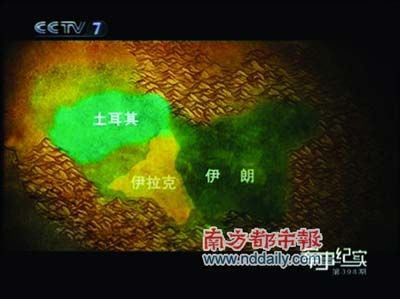
On the same day, a netizen took a screen capture of this map and posted it to
the NGA Forum. The netizen asserted that this map was based upon a map
from the online game World of Warcraft, as seen in the the following screen
capture.

Is this copyright violation? Some netizens thought that World of
Warcraft is based upon the real world and there was no harm to imitate an
imitation of the real world. Other netizens said that people should
appreciate the sly humor of the CCTV workers who did this.
[015] How to Vote in the Taiwan Legislature Election (01/08/2007) (Glenda Lo's blog)
... My election strategy is this: When the Kuomintang Party dominated back then, I always voted and I always voted for the Democratic Progressive Party. The reason was very simple: You cannot have a game played between an adult and a child, and so we must let the child grow up quickly. I did not imagine that the child would quickly become an adult and knock down the old man, but then they proved to be even more adept in doing bad things. From there on, I began to vote for the candidates instead of their parties. If I cannot find anyone acceptable, I refused to cast a ballot.
But it is different this year. There will be two elections that will affect the future of Taiwan. So rule 1 of my voting strategy is: I must vote and I must not cast a blank ballot.
The Presidential election in March will determine the ruling party and the future of Taiwan for the next four years. This is obviously important. There are no further strategic considerations because all I have to go and vote. My principle is that I will vote for the person and not for the party. I will absolutely not vote for some president who talks rubbish frequently, commits misdeeds and sows discord among the people; I will vote for a party with more capable administrative talents and I will vote to teach the bad party a lesson. At the present stage, the ruling DPP party is that bad party. Also, the presidential election will determine who gets the majority share of the pie and those who have tasted the sweetness will not easily give up. So we must be watchful about dirty tricks.
Then there is the Legislative Yuan election and referenda. For the referenda that are bringing the voters into derision, I will refuse to get the ballot. At the same time, the referenda about joining/entering the United Nations are also rubbish, so I will ignore them. To refuse to get the ballot is not to answer to the call and beckon of the Kuomintang. Instead, this is a statement to the two parties of crooks: "Please do not insult the intelligence of the citizens."
The district Legislative Yuan election will be a battle between the two major parties. Most people expect the Kuomintang to win more than half of the seats, and therefore maintain a steady majority in the Legislative Yuan. However, for the people, reducing the number of seats by half means that the power of each legislator can cause double the harm previously. Therefore, my rule 2 is: The priority task in the district Legislative Yuan voting is to "prevent bad people from getting in."
How do you even stop these people? The candidates in the district Legislative Yuan election are all the same old faces, so you have to choose the least bad one. A few days ago, I said so in class and a student shook his head to say: "But there is no such person!" Sigh! If there are no good apples, then you employ a process of elimination for those who buy votes, get into fights, corner construction projects, lobby for special interests, self-enrich, engage in business-government collusion, have poor attendance records, grandstand for the media, talk nonsense, spend too much time with the grassroots (when a legislator shows up at all your family funerals and weddings, how much time does he spend on his proper duties?). You eliminate everything rotten. If the two candidates are equally rotten in all aspects, then I will invoke rule 3: I will teach the bad party a lesson. When the two parties are at parity in terms of badness, the vote of the neutral voter is often critical.
Since the district Legislative Yuan election has been hijacked by the two political parties, the nationwide party vote is the one in which we can express our true will. For this vote, we have eleven political parties to choose from. Voting strategy rule 4: For the nationwide party vote, stay away from big brothers number one and two.
If you are satisfied with the eight years of DPP rule and their list of candidates, please vote for them! If you are satisfied with the KMT and what their Legislative Yuan majority has done for the last three years as well as their list of candidates, please vote for them! You are free to do so. But if you are not satisfied, why should you cast a vote to encourage them?
Of course, many people would say that a vote for a minor party is a waste and would not change anything because the smaller parties are not expected to pass the 5% threshold needed to gain a Legislative Yuan seat. In theory, if everybody refused to vote for the big two political parties, then the top two candidates of the independent parties will be elected. In practice, the "iron" votes of the big two political parties will probably mean that none of the minor parties will have representation.
So what? At the very least, I will have used my ballot to tell the big two parties: "You stink! And I'm angry!" ...
[014]
Hong Kong By The Numbers (01/08/2007) (Chinese University
of Hong Kong, Hong Kong Institute of Asia-Pacific Studies) (909 persons
age 18 or over were interviewed between January 2 and 4)
Q1. The National People's Congress Standing Committee made the decision last
week that there would be no double universal suffrage in 2012. But there
may be universal suffrage of the Chief Executive in 2017, followed by the
Legislative Council later on. Do you accept this decision?
5.3%: Completely unacceptable
21.4%: Unacceptable
58.2%: Acceptable
14.0%: Completely acceptable
6.5%: Don't know/hard to say
Q2. The National People's Congress Standing Committee decision also said that
the ratio of directly elected seats versus the functional constituency seats
will remain unchanged in 2012. However, the details may be determined in
accordance to the Basic Law. Do you accept this decision?
6.3%: Completely unacceptable
27.1%: Unacceptable
55.3%: Acceptable
10.5%: Completely acceptable
7.2%: Don't know/hard to say
Q3. After the NPCSC decision was announced, certain groups held firm on double
universal suffrage for 2012 and have started to organize a protest march.
Do you support what they are doing?
17.4%: Completely unsupportive
39.2%: Unsupportive
31.2%: Supportive
5.1%: Completely supportive
7.2%: Don't know/hard to say
Q4. NPCSC deputy secretary-general Qiang Xiaoyang pinted out that the decision
made by the NPCSC with respect to the Hong Kong is derived from the
constitutional authority of the central government. Do you agree with
his position?
4.3%: Completely disagree
26.1%: Disagree
50.5%: Agree
12.9%: Completely agree
6.3%: Don't know/hard to say
Q5. Some people think that the fact that the NPCSC has made a clear decision
about the time table for double universal suffrage and this will resolve the
social debate over the time schedule for political reform. Do you agree
with this view?
4.6%: Completely disagree
31.0%: Disagree
49.7%: Agree
8.1%: Completely agree
6.5%: Don't know/hard to say
Q6. Some people think that the clear decision by the NPCSC on a time table for
double universal suffrage is a major breakthrough for political reform in Hong
Kong. Do you agree?
4.7%: Completely disagree
28.9%: Disagree
52.9%: Agree
8.5%: Completely agree
5.1%: Don't know/hard to say
Q7. The NPCSC has made a clear decision about the time table for double
universal suffrage. How confident are you about the implementation of
this time table?
9.0%: Completely lack confidence
25.7%: Lack confidence
46.8%: Have confidence
13.0%: Completely have confidence
5.5%: Don't know/hard to say
Q8. Generally speaking, do you think that the Hong Kong SAR government gave a
full effort to obtain universal suffrage for the people of Hong Kong?
11.5%: Completely did not give full effort
22.6%: Did not give full effort
52.3%: Gave full effort
9.9%: Completely gave full effort
3.7%: Don't know/hard to say
Q9. Generally speaking, do you think the central government is sincere about
having universal suffrage in Hong Kong?
8.1%: Totally insincere
20.2%: Insincere
56.6%: Sincere
12.9%: Totally sincere
2.3%: Don't know/hard to say
Q10. Generally speaking, do you think that the NPCSC's decisions about
political reform in Hong Kong reflected the needs of the Hong Kong people with
respect to political reform?
9.7%: Completely did not reflect
17.6%: Did not reflect
58.7%: Reflected
10.4%: Completely reflected
3.6%: Don't know/hard to say
(Apple
Daily) Democratic Party founder Martin Lee said that the HKIAPS
poll was misleading because it only related the decision made by the NPCSC
without spelling out the devil in the details (such as the high barrier for
entry into the Chief Executive election and the retention of the functional
constituency in the Legislative Council). Lee said, "This poll obviously
wanted to coordinate with the government to push the attendance at the
demonstration march on Sunday." Chinese University of Hong Kong
Political and Administrative Sciences Department associate professor Ma Ngok
said that the poll emphasized that universal suffrage for the Chief Executive
may happen without highlighting the fact that the central government rejected
double universal suffrage for 2012. "Therefore, these results are very
much expected." Ma Ngok thinks that the message from this poll is
unclear: "Accepting the NPCSC decision does not mean supporting that
decision."

How long can a person get along without reading an erotic magazine? Normally speaking, a Chinese man may never see a naked female body other than that of his wife for his entire life. Nevertheless, the Chinese people have still managed to make China the most populous nation in the world. As for foreigners, especially from those countries where erotic magazines and newspapers are published and distributed freely, this question does not appear to be answered.
But we now have the answer to this sociological question: It is around 20 days. According to Xinhua, "One world, one dream. That is the slogan for the 2008 Beijing Olympics. During the period when the Olympic dream is being realized, the Chinese government will remove restrictions and allow foreign correspondents to gather information freely. Previously banned magazines (such as Playboy) and newspapers (such as The Sun (UK)) will be permitted to go on sale. But once the Olympics are over, these magazines will be banned again." This implies that the foreigners do not have the endurance to last the 20 days or so for the Olympics without reading Playboy or similar publications.
Back in the days when we lacked material goods, we used to have the practice of putting all sorts of merchandise on store counters for the special foreign guests to see in order to create an atmosphere of prosperity. Things are different now and there is plenty of merchandise in the supermarkets. Instead, we are also putting 'spiritual food' for sale. So who says that the times are not moving ahead?
... There is something upsetting about this. Only under the gaze of the whole world did the relevant department lift the ban for about 20 days. As soon as the gaze is turned away, we are treated once again as "children" who are capable only of doing things like trading with foreign nations, writing computer programs or sending rockets to the moon ...
The other upsetting aspect is that the legendary "Chinese and dogs not allowed" sign is being displayed in a different manner. Back then, it was discrimination to say that the park is not built for the Chinese and therefore they were not allowed to enter. Playboy is not meant for Chinese readers and they are being allowed to read it courtesy of the presence of foreign guests ...
Apart from anger, there is also hilarity. This decision not only insults the Chinese people, but it also insults the foreigners. As everybody knows, the countries where these publications are created have fairly conservative mainstream values and not many people walk around town with a copy of Playboy in hand. It is not certain that the foreigners would appreciate these publications in Beijing because the implication is that they are sex fiends. This is like inviting a friend to stay at your house and then placing some condoms and erotic DVD's by the bedside. Your guest is not likely to be pleased.
[in translation]
The mainland organizations based in Hong Kong have always refused to include Apple Daily in their multiple fax list. For each news event, they could impose obstructions by saying: "But you did not register!" in order to discourage us. The same thing occurred on January 3.
The Hong Kong People's Congress Election Committee held its first meeting. As expected, Apple Daily did not receive a registration form. So this reporter had to try to "crash the gate" once again. Based upon past experience, the unregistered Apple Daily reporter shall arrive at the venue, be given a hard time but eventually allowed to enter -- unless the subject is something that the Ministry of Foreign Affairs is really sensitive about.
This occasion was no exception. Naturally, there were some verbal repartee. At 8:30am, I went up to the registration desk with my photographer. The putonghua-speaking worker asked which newspaper I worked for. "Apple Daily." Without even checking the list, that woman said: "You did not register."
"It is not that we did not register. Rather, it is you never sent over a fax for us to register." It was early in the morning and I was particularly annoyed because I had to crawl out of my warm bed to face the cold wintry air. That woman summoned a senior male official and they conversed for a while. "If I did not get your fax, then how was I supposed to register?"
"Alright, I'll let you register. But I don't know if we have any more spare press passes." Now isn't this deliberate obstruction!? I got angrier. "Isn't that so? Such a large organization and you don't have press passes?" Good and bad guys have one thing in common -- they don't want to deal with bitchy women! After tussling for several minutes, we received the press passes with no names just like all the other reporters. So what is the point of the show that went on before?
If this were in mainland China, then Apple Daily had no choice but be banned. But we are in Hong Kong here and now. This is a cosmopolitan city under "one country, two systems." If our newspaper were restricted while gathering information in our own city, then this could be an international news item. If Apple Daily were refused to enter, then press freedom has been curtailed and it would be unavoidable for Apple Daily to make this a major issue. So why bother with the routine?
... This pointless press card wasted several minutes of my life ...
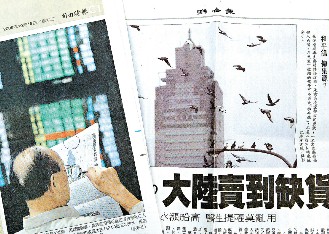
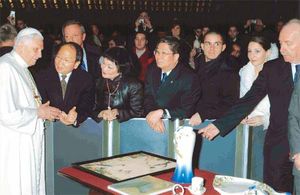
On December 12, a Taiwan delegation with the Franz Collection company went to The Vatican to present a set of blue porcelain to the Pope. Phootographs on this occasion was taken by the staff of the Taiwan embassy, and then distributed by Franz Collection to the media. On the right is the photograph that appeared on Liberty Times on December 17. On the left is the photograph as issued by the Taiwan embassy to Central News Agency for release. A reader complained to United Press Daily that the original photograph (on the left) contained a woman who had been cropped out of the photograph in Liberty Times.Who was that woman? She is Wang Shaw-lan, the pubisher of United Daily News.
So what happened here? Is this another replay of the 2005 case in which Liberty Times altered an Agence France Presse photograph to make a man reading United Daily Press read Liberty Times instead?
Liberty Times deputy editor-in-chief Teng Wei-wei told the UDN reporter doing this story that the truth was that when their reporter Chang Ning-hsing received the photograph, she thought that the focus should be on the Pope and Franz Collection. So she asked Franz Collection for a photograph without Wang Shaw-lan. This was the photograph that was published in Liberty Times. When told that Franz Collection claimed that all their photographs had Wang Shaw-lan in them, Teng Wei-wei said that Franz Collection was lying and their reporter has copies of all the email and fax exchanges to prove that the photograph had been provided by Franz Collection (see Liberty Times).
This UDN reporter contacted the Liberty Times female reporter Chang Ning-hsing who had written the story that accompanied the cropped photograph. At first, Chang claimed that the photograph had been supplied by Franz Collection. The UDN confirmed with her three times that this was the case, and then indicated that Franz Collection would be contacted for confirmation. At that point, Chang changed her story.
Chang Ning-hsing admitted she had cropped Wang out of the photograph. Her reason was that (1) the photograph was too long and did not look right for a story that appeared down a vertical column. Besides, Wang should not the focus of the story. Furthermore Wang is the publisher of another newspaper. When Chang received the photographs, she made an inquiry to Franz Collection whether there was another one without Wang in it. She claimed that Franz Collection said Wang appeared in all the photographs, but gave permission to her to modify. Franz Collection said that they merely provided the photographs and denied ever giving permission. Franz Collection was "surprised" when they saw the published photograph in the newspaper.
Another UDN story was titled: "What is the difference between this and the Communists?" with this reprise.
(China Times) A Franz Collection spokeswoman said: "We responded to the request from Liberty Times and made certain modifications. But the rest of the media received the photograph provided by the Ambassador. We manufacturing companies cannot control what the media do." Yes, but does it matter who did the cropping? The fact was that Liberty Times took the initiative to alter a photograph and that is not what photojournalism is usually about.
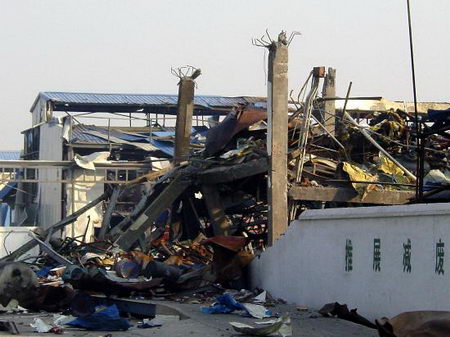
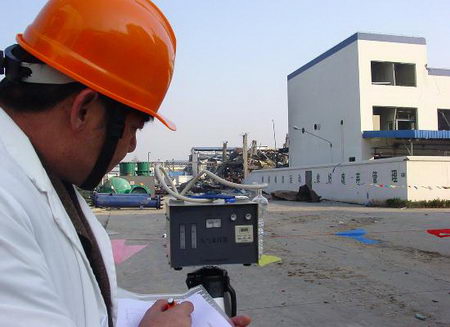

The Broadcasting Authority yesterday issued advice to two radio stations in relation to two complaints filed by members of the public against two programmes. The first involved RTHK radio programme Investment Era broadcast on September 22, during which a host of the financial programme featuring information on investments used an offensive expression when talking to a caller and a guest host about the economic development around Tianjin and the Bohai Rim."The expression uttered in the programme was a foul expression which was regarded as offensive and unacceptable for broadcast on a sound broadcasting service by an average person," the authority said. RTHK was therefore advised to observe the Radio Code of Practice on Programme Standards, which prohibits the use of offensive expressions, the authority said.
What was said? According to The Sun, the foul expression was "你話×知佢…… ("you fucking tell him ..."). Of course, The Sun used "x" instead of the obscene word which would have been referred to the Television and Entertainment Authority/Obscene Articles Tribunal.
There are actually three candidates for what "x' is. Presently, the Hong Kong government classified five Cantonese words as obscene: diu2, hai1, lan2, gau1 and cat6. The first is a verb, the second is a noun/adjective and the other three can be used adverbs. In the aforementioned phrase, "x" is either lan2, gau1 or cat6, with the most likely being lan2. In English, the translation is always "fucking" because the English language does not have so many different obscene terms.
Reference: 廣東話粗口 (內容會引起情緒不安, 不喜者勿入)
Archives